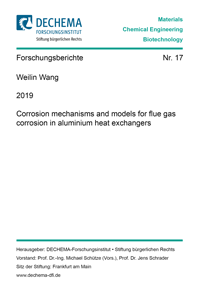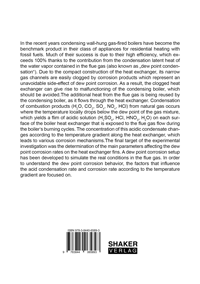
Shop : Details
Shop
Details
48,80 €ISBN 978-3-8440-6589-3Softcover186 pages96 figures275 g21 x 14,8 cmEnglishThesis
April 2019
Weilin Wang
Corrosion mechanisms and models for flue gas corrosion in aluminium heat exchangers
In the recent years condensing wall-hung gas-fired boilers have become the benchmark product in their class of appliances for residential heating with fossil fuels. Due to the compact construction of the heat exchanger, its narrow gas channels are easily clogged by corrosion products which represent an unavoidable side-effect of dew point corrosion. As a result, the clogged heat exchanger can give rise to malfunctioning of the condensing boiler, which should be avoided.The additional heat from the flue gas is being reused by the condensing boiler, as it flows through the heat exchanger. Condensation of combustion products from natural gas occurs where the temperature locally drops below the dew point of the gas mixture, which yields a flim of acidic solution on each surface of the boiler heat exchanger that is exposed to the flue gas flow during the boiler's burning cycles. The concentration of this acidic condensate changes according to the temperature gradient along the heat exchanger, which leads to various corrosion mechanisms.The final target of the experimental investigation was the determination of the main parameters affecting the dew point corrosion rates on the heat exchanger fins.A dew point corrosion setup has been developed to simulate the real conditions in the flue gas. In order to understand the dew point corrosion behavior, the factors that influence the acid condensation rate and corrosion rate according to the temperature gradient are focused on. A dew point corrosion setup has been developed to simulate the real conditions in the flue gas.
Keywords: Dew point corrosion; Aluminium silicon alloy; corrosion mechanisms
Schriftenreihe des DECHEMA-Forschungsinstituts
Edited by DECHEMA-Forschungsinstitut, Frankfurt am Main
Volume 17
Available online documents for this title
You need Adobe Reader, to view these files. Here you will find a little help and information for downloading the PDF files.
Please note that the online documents cannot be printed or edited.
Please also see further information at: Help and Information.
Please also see further information at: Help and Information.
| Document |  | Document | ||
| Type |  | |||
| Costs |  | 36,60 € | ||
| Action |  | Purchase in obligation and download the file | ||
| Document |  | Table of contents | ||
| Type |  | |||
| Costs |  | free | ||
| Action |  | Download the file | ||
User settings for registered online customers (online documents)
You can change your address details here and access documents you have already ordered.
User
Not logged in
Export of bibliographic data
Shaker Verlag GmbH
Am Langen Graben 15a
52353 Düren
Germany
Am Langen Graben 15a
52353 Düren
Germany
Mon. - Thurs. 8:00 a.m. to 4:00 p.m.
Fri. 8:00 a.m. to 3:00 p.m.
Fri. 8:00 a.m. to 3:00 p.m.
Contact us. We will be happy to help you.



